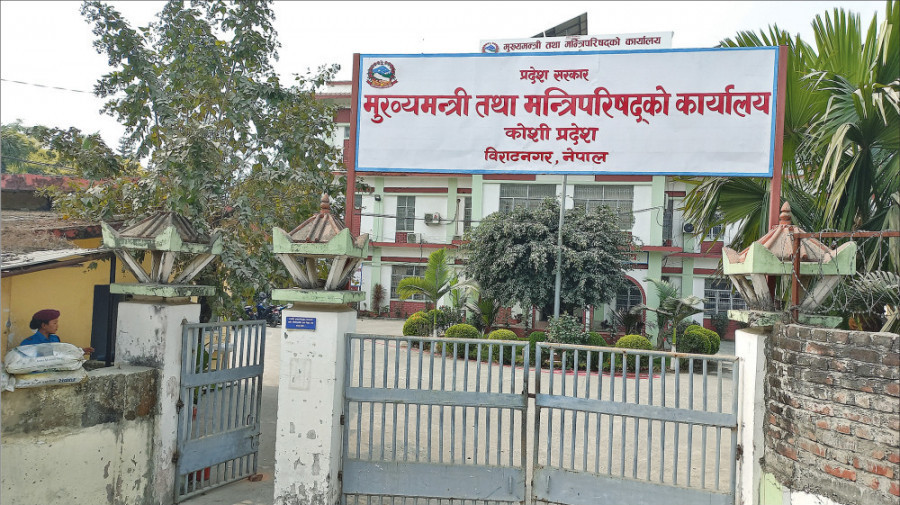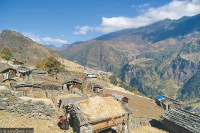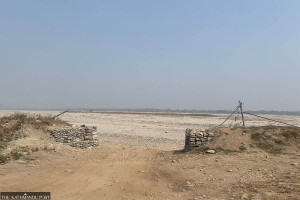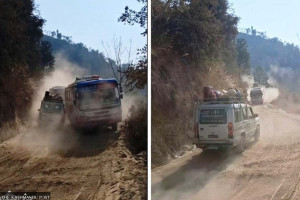Koshi Province
Koshi government formation process back to square one
Existing alliance is trying to rope in the RPP. UML changes tack saying it’s ready to partner with the Nepali Congress.
Nishan Khatiwada
Koshi Province head Parshuram Khapung has called upon political parties for the formation of the provincial government as per the Article 168(2) of the Constitution by Tuesday. With this, the parties have begun exploring options to form a new government in the province.
Parties in the Nepali Congress-led alliance including the Maoist Centre, the CPN (Unified Socialist), and the Janata Samajbadi Party are in talks with the Rastriya Prajatantra Party (RPP) in their attempt to put together a majority. Alliance leaders say they may even have to offer the chief ministerial position to the RPP. On the other hand, the CPN-UML, which currently has the backing from the Rastriya Prajatantra Party, says it is ready to join hands with the Congress to form a government.
“We will try to garner a majority under Article 168(2). We have been in continuous talks with the RPP for the same,” Uddhav Thapa, Nepali Congress parliamentary party leader in Koshi, told the Post.
The Supreme Court, on Thursday, removed Congress leader Uddhav Thapa from the post of chief minister. It also directed both the head of the Koshi Province and Speaker of the provincial assembly to appoint a chief minister of a coalition government within seven days. The Province Head Khapung, accordingly, asked the political parties to stake claim for the government leadership on Friday.
The UML has also publicly announced that it is ready to join hands with the Congress to form a stable government in Koshi.
Speaking at a press conference in Biratnagar on Friday, Hikmat Karki, UML parliamentary party leader of Koshi, said the party, which is in discussion with other parties of the Congress-led alliance, is also open to partnering with the Congress. “The chief ministerial position will not be a hindrance. It can be entrusted to anyone.”
But without any change in the existing political alliance, a coalition government cannot be formed in Koshi. The ruling alliance of the Congress, the Maoist Centre, the Unified Socialist and the Janata Samajbadi have 46 lawmakers combined. The opposition alliance of the UML and the Rastriya Prajatantra Party has the same strength, with 40 and six lawmakers, respectively. Both the alliances are one lawmaker shy of the majority required to form a new government.
UML’s Koshi Chief Whip Rewati Raman Bhandari said they are trying to form a stable government either under Article 168(2) or Article 168(3). “We will reach out to the Congress and all other parties for support.”
Leaders of the Congress-led alliance, however, see little chance of partnership with the UML as that will mean breaking up the federal coalition.
“The UML has approached us to lead the provincial government by turns. But the Congress provincial unit cannot decide the matter—only the top central leadership of the coalition can do so,” said Thapa.
Maoist Centre provincial lawmaker Durga Prasad Chapagain said that neither the Congress nor the Maoist Centre is likely to break their alliance in order to join hands with UML, given the current state of national politics. “The UML has also approached us saying that communist forces should come together. But that is unlikely,” he said.
Khapung, the head of the province, on July 6 had appointed Thapa as Karki’s successor after the ruling alliance produced the signatures of 47 lawmakers including Baburam Gautam, Speaker of the assembly. Thapa became chief minister of a coalition government as per Article 168 (2) of the constitution. The next day, the UML moved the Supreme Court demanding Thapa’s removal and Karki’s reinstatement as chief minister. As asked by the petitioner, the Supreme Court said Speaker Gautam cannot play any part in government formation, and unseated Thapa.
The Congress-led alliance can now form a government if the RPP comes into its fold. And the alliance leaders have been saying that they may have to offer the RPP chief ministership for a certain period.
Maoist lawmaker Chapagain agreed that in order to ensure RPP’s support, they may have to consider rotating the chief ministerial position with the party over the remaining term of the assembly. “The Speaker’s resignation is another option, but that will bring constitutional complications during the vote of confidence.”
The RPP leaders said they are weighing their options.
Chapagain sees another option as well. “If all the parties come to a common understanding, an all-party provincial government can be formed with parties leading it by turns.”
Despite their differences, all parties in Koshi, however, negate the idea of going to a midterm election. “No party in the province is ready for a midterm poll,” added Chapagain.
The UML, as the largest party in the provincial assembly, will get to form the government as per Article 168 (3), if no alliance can present the support of 47 lawmakers.
Article 168(3) of the Constitution states if a government cannot be formed under 168 (2), the provincial head will appoint as chief minister the parliamentary party leader of the party with the highest number of members in the provincial assembly. The chief minister of such a minority government, however, must secure a vote of confidence within 30 days.
And if the UML-led government fails to win the confidence of the assembly, Article 168 (5) gives the last option to a lawmaker in the assembly to stake a claim presenting the support of a majority of lawmakers. If Article 168(5) does not work, the province will head for a midterm election.
“Midterm election would not be a good idea, because it will go against public sentiment and backfire on federalism. Anti-federalist voices and criticism of the federal system have of late become active,” Bhandari told the Post.
“Our party is of the view that the province should not go for midterms and a government should be formed based on Article 168(2). We will discuss the issue in the party now,” said Sagun Sundar Lawati, RPP spokesman.




 9.7°C Kathmandu
9.7°C Kathmandu












